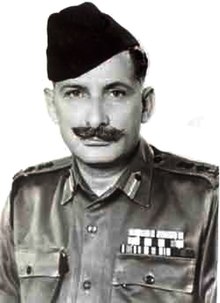
Back سام مانكشو Arabic سام مانكشو ARZ सैम मानेकशॉ Bihari শ্যাম মানেকশ’ Bengali/Bangla Sam Manekshaw German Sam Manekshaw Spanish سم منکشاو Persian Sam Manekshaw Finnish જનરલ સામ માણેકશા Gujarati सैम मानेकशॉ Hindi
Sam Manekshaw | |
|---|---|
 Manekshaw pictured wearing his General's insignia. | |
| 7th Chief of the Army Staff, India | |
| In office 8 June 1969 – 15 January 1973 | |
| President | V. V. Giri Mohammad Hidayatullah |
| Prime Minister | Indira Gandhi |
| Preceded by | General P. P. Kumaramangalam |
| Succeeded by | General Gopal Gurunath Bewoor |
| 9th General Officer Commanding-in-Chief, Eastern Command | |
| In office 16 November 1964 – 8 June 1969 | |
| Preceded by | Lt Gen P P Kumaramangalam |
| Succeeded by | Lt Gen Jagjit Singh Aurora |
| 9th General Officer Commanding-in-Chief, Western Command | |
| In office 4 December 1963 – 15 November 1964 | |
| Preceded by | Lt Gen Daulet Singh |
| Succeeded by | Lt Gen Harbaksh Singh |
| 2nd General Officer Commanding, IV Corps | |
| In office 2 December 1962 – 4 December 1963 | |
| Preceded by | Lt Gen Brij Mohan Kaul |
| Succeeded by | Lt Gen Manmohan Khanna |
| Personal details | |
| Born | Sam Hormusji Framji Jamshedji Manekshaw 3 April 1914 Amritsar, Punjab Province, British India |
| Died | 27 June 2008 (aged 94) Wellington, Tamil Nadu, India |
| Resting place | Parsi Zoroastrian Cemetery, Ooty, Tamil Nadu, India |
| Spouse | Silloo Bode |
| Nickname | "Sam Bahadur"[1] |
| Military service | |
| Allegiance | British India India |
| Branch/service | British Indian Army Indian Army |
| Years of service | 1934 – 2008[a] |
| Rank | Field Marshal |
| Unit | 12th Frontier Force Regiment 8th Gorkha Rifles |
| Commands | |
| Battles/wars | |
| Awards | |
| Service number | IC-14 |
Field Marshal Sam Hormusji Framji Jamshedji Manekshaw[3] MC (4 April 1914 – 27 June 2008), also known as Sam Bahadur ("Sam the Brave"), was the chief of the army staff of the Indian Army during the Indo-Pakistani War of 1971, and the first Indian Army officer to be promoted to the rank of field marshal. His active military career spanned four decades, beginning with service in World War II.
Manekshaw joined the first intake of the Indian Military Academy at Dehradun in 1932. He was commissioned into the 4th Battalion, 12th Frontier Force Regiment. In World War II, he was awarded the Military Cross for gallantry. Following the Partition of India in 1947, he was reassigned to the 8th Gorkha Rifles. Manekshaw was seconded to a planning role during the 1947 Indo-Pakistani War and the Hyderabad crisis, and as a result, he never commanded an infantry battalion. He was promoted to the rank of brigadier while serving at the Military Operations Directorate. He became the commander of 167 Infantry Brigade in 1952 and served in this position until 1954 when he took over as the director of military training at Army Headquarters.
After completing the higher command course at the Imperial Defence College, he was appointed the general officer commanding of the 26th Infantry Division. He also served as the commandant of the Defence Services Staff College. In 1962, he was accused in a politically motivated treason trial, he was eventually found innocent but thus could not serve in the 1962 war. In 1963, Manekshaw was promoted to the rank of army commander and took over Western Command, then was transferred in 1964 to Eastern Command. In this role, in 1967, he presided over the first Indian victory against a Chinese offensive during the Nathu La and Cho La clashes.
Manekshaw was awarded the Padma Bhushan, the third highest Indian civilian award, in 1968 for responding to the insurgencies in Nagaland and Mizoram. Manekshaw became the seventh chief of army staff in 1969. Under his command, Indian forces conducted victorious campaigns against Pakistan in the Indo-Pakistani War of 1971, which led to the creation of Bangladesh in December 1971. He was awarded the Padma Vibhushan, the second highest civilian award of India, in 1972 for his services to the nation. Manekshaw was promoted to the rank of field marshal in January 1973, the first of only two Indian officers to be ever promoted to this rank. He retired on 15 January 1973, a date celebrated as Army Day in India. Manekshaw died on 27 January 2008 due to complications from pneumonia.
- ^ "Sam Manekshaw: Leaders Pay Tribute To India's Greatest General". NDTV. 3 April 2019. Archived from the original on 12 August 2019. Retrieved 17 December 2019.
- ^ Mehta 2003.
- ^ Pandya 2008.
Cite error: There are <ref group=lower-alpha> tags or {{efn}} templates on this page, but the references will not show without a {{reflist|group=lower-alpha}} template or {{notelist}} template (see the help page).
© MMXXIII Rich X Search. We shall prevail. All rights reserved. Rich X Search